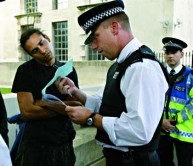 Only one in every 400 stop and searches carried out under sweeping anti-terrorism laws leads to an arrest, official figures released yesterday reveal, triggering fresh pressure on the government and police over the controversial tactic.
Only one in every 400 stop and searches carried out under sweeping anti-terrorism laws leads to an arrest, official figures released yesterday reveal, triggering fresh pressure on the government and police over the controversial tactic.
Official government figures covering 2005/6, the first since the July 7 2005 bombings on London, show a big increase in the use of the power, with Asian people bearing the brunt. One force, City of London, carried out 6,846 stops of pedestrians and vehicles without finding enough evidence to justify a single arrest.
Stops under the Terrorism Act 2000 rely more on an officer’s discretion than other powers to search, which require reasonable suspicion. The number of stops under terrorism laws in 2005/6 showed a 34% rise on the previous year to 44,543. Asians faced an increase of 84%, black people an increase of 51%, searches of “other” ethnic groups rose 36% and white people faced a 24% increase.
Experts believe anti-terrorism stop and searches have not led to a single person being caught who was later convicted of a terrorist offence. Ben Bowling, professor of criminal justice at King’s College London, said:
“If these people arrested were in possession of bombs you might say that’s fine, but I can’t recall a case where that’s happened. These powers are being used indiscriminately with a minimal result. The consequence of that is a loss in public confidence and a drop of support among those stopped without reason for the police.”
